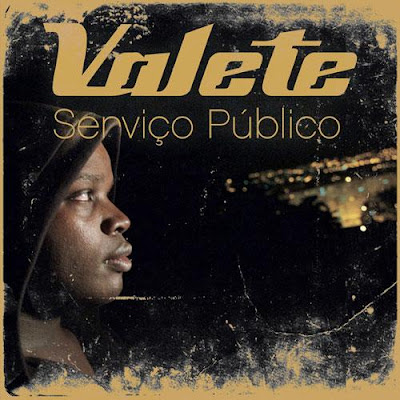 Back in the day, when I still lived in Peniche (a small sea-side town in Portugal), my brother Paulo and my cousin Songay would put this rapper’s CD in the stereo system and straight up jam. I still remember certain tracks from Boss AC’s first album nearly by heart; such was the frequency with which he was played in my household. Back then I wasn’t the biggest fan of rap or hip hop – how times have changed. Boss AC was one of the first to rap in Portuguese, back when hip hop in Portugal was very underground and underappreciated. Boss AC was a pioneer. Originally from Cape Verde, he quickly established himself as one of Portugal’s premier rap artists, and his debut album Manda Chuva, partly produced by Troy Highwater (who also produced works by LL Cool J, Outkast, Busta Rhymes, etc) was pretty damn good. He followed that album with his second effort, Rimar Contra Maré, but it was his third album, R.A.P. – Ritmo, Amor, e Palavras, that in my opinion was his most accomplished one yet.
Back in the day, when I still lived in Peniche (a small sea-side town in Portugal), my brother Paulo and my cousin Songay would put this rapper’s CD in the stereo system and straight up jam. I still remember certain tracks from Boss AC’s first album nearly by heart; such was the frequency with which he was played in my household. Back then I wasn’t the biggest fan of rap or hip hop – how times have changed. Boss AC was one of the first to rap in Portuguese, back when hip hop in Portugal was very underground and underappreciated. Boss AC was a pioneer. Originally from Cape Verde, he quickly established himself as one of Portugal’s premier rap artists, and his debut album Manda Chuva, partly produced by Troy Highwater (who also produced works by LL Cool J, Outkast, Busta Rhymes, etc) was pretty damn good. He followed that album with his second effort, Rimar Contra Maré, but it was his third album, R.A.P. – Ritmo, Amor, e Palavras, that in my opinion was his most accomplished one yet.The three tracks featured here are from his third album, which not only went platinum in Portugal, but is one of the top three highest selling hip hop CDs in the country and earned Boss an MTV Europe nomination for Best Portuguese Act. One of my favorite tracks of Portuguese rap is Boa Vibe, featuring Carla Moreira. It’s a loungey, low key affair in which he describes the meaning of boa vibe, or in English good vibes, or in Spanish buena onda; the translations are many but the feeling is the same. Hip Hop (Sou eu e es tu) is his ode to the genre, and in it he waxes lyrical about the meaning of hip hop in his life, what he thinks hip hop is, and what he thinks it is not. Lastly there is the gem here, Que Deus, which evokes memories of Valete’s Revelação. Again, the theme is questioning many of God’s decisions and whether He even exists at all, and it is a telling intellectual piece. But the striking thing about that track is that it features Pedro Ayres Magalhães of Madredeus, as well as Teresa Salgueiro’s voice throughout. I mean, once you click play and hear the violins, you’ll notice that it is no ordinary hip hop track. Not many other rappers thought that mixing Madredeus unique sound with hip hop would be a good idea, but here Boss AC does it wonderfully.
Boa Vibe
Hip Hop (Sou eu e es tu)
Que Deus
Ainda me lembro dos tempos antigos em Peniche (Portugal), quando o meu primo Songay e o meu irmão Paulo punham músicas deste rapper na nossa aparelhagem a alto volume. Eu ainda era um puto franzino que não achava la grande coisa sobre hip hop. Como as coisas mudam. Hoje tenho um grande respeito por Boss AC, um dos primeiros rappers que comecei a ouvir com frequência. Ele é um dos pioneiros do rap tuga, desde os tempos em que o movimento hip hop ainda era algo muito underground em Portugal. O Boss é de origem Cabo-Verdiana, e as suas raízes africanas estão presente nos seus albuns, o primeiro dos quais chamou-se Manda Chuva, o tal album tocado diariamente pelo meu cousin e brada. Manda Chuva foi parcialmente produzido por Troy Highwater, que tambem trabalhou com Busta Rhymes, Outkast, LL Cool J, etc. Boss AC não brinca em serviço. O seu segundo album foi Rimar Contra a Maré, mas o meu preferido, o album em que Boss AC arrasa com tudo e todos, foi o seu terceiro, intitulado R.A.P. – Ritmo, Amor, e Palavras.
As três músicas destacadas aqui são do seu terceiro album, que não só atingiu a marca de Disco de Platina, mas continua sendo um dos três CDs de hip hop mas vendidos em Portugal. Em 2005 foi nomeado para os prémios da MTV Europe como Best Portuguese Act. Este album contem um dos meus raps preferidos em portugues, o Boa Vibe, o ’feeling positivo a pairar no ar’. Em inglês se diz good vibes, em espanhol buena onda – é engraçado que cada lingua tem uma expressão para descrever esse sentimento universal. Boa Vibe é cantado com Carla Moreira e é um som suave e low key. A segunda canção, Hip Hop (Sou eu e es tu) foi um sucesso enorme no mundo lusofono. “Hip hop não é a banda sonora dum crime,” diz o Boss. Que Deus, o ultimo som destacado aqui, de certeza que o fará lembrar do rap Revelação, de Valete. É um rap intellectual, em que Boss AC faz perguntas e criticas a Deus e questiona a sua existência. Mas o que realmente eleva o valor deste track é a produção de Pedro Ayres Magalhães dos Madredeus, e, claro, a voz de Teresa Salgueiro. Não é todos os dias que se ouve um rap com arranjos de violinos e elementos de fado, mas Boss AC não é qualquer um.
- Photo by Nokia On.Live
Boss AC Official website
Boss AC on iTunes
























